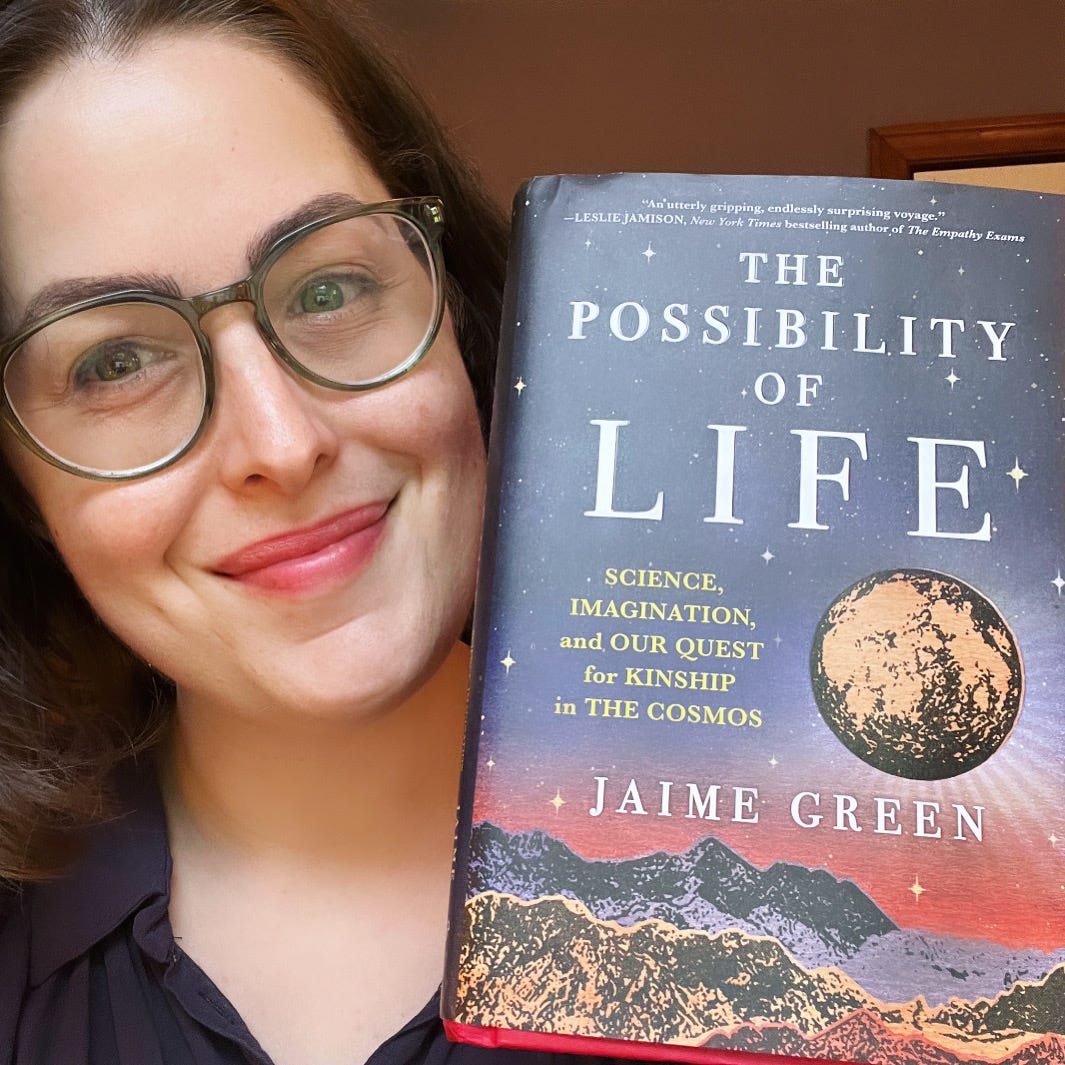The Possibility of Life was published one week ago today. The biggest mindfuck of the experience so far is how nothing really changes on pub day. Yes, the book can now be in a lot more people’s hands—any preordered ebooks and audiobooks auto-download—but the book had already been leaking its way into the world, first as advance copies to reviewers and industry folks, then mailed finished copies to everyone I interviewed in the book and then some. I’ve had boxes of the book sitting in my office for weeks. Then the calendar flips over to Tuesday, 4/18/23. And it’s not like suddenly everyone’s read the book, even the people who preordered it. The whole thing stays a trickle. You watch the creek bed and hope for rain, but there’s no knowing when it might happen. You feel silly for stockpiling sandbags.
The praise of pub day is “you did it!” but I’m really holding out for “I read it!” I described the feeling to a fellow spring debut author as like eating olestra potato chips: your body thinks it’s nourishment but all you get is a stomach ache. The real food—the rain—is slower in coming.
But! We fill some jugs at the sink and pour them into the dry bed. Or take a few hammer whacks at the dam upstream. Is this metaphor still making sense? What I mean is, around the book’s release, I published an essay and some excerpts online, have been on some podcasts, and got a couple of reviews. Last Tuesday was a whirlwind and I don’t trust social media anymore to really do anything, so below are links to all of that, in case you’d like to read some.
But first, thank you if you’ve bought the book, or requested it from your library, or told a friend about it. I do have to ask: if you’ve read it and liked it, or if in the future you do, please leave a review on Amazon. It really does help books find their readers. Ugh. But if you want to buy it, here are a bunch of retailers to choose from: my local indie River Bend Bookshop, Bookshop, Amazon, B&N, IndieBound, Google Play, Kobo, Apple Books, Libro.fm. And in the UK: Waterstones, Amazon, Bookshop. (I narrate the audiobook myself, and while I feel my skeleton try to leave my body if I start to listen to it, I’m very proud of the work I did.)
Okay here’s all the links. I hope you’ll read a couple, I hope you enjoy them, thanks and I love you.
an Essay
I Wrote a Book About Aliens. But My Favorite Ones Lived on Earth. at Slate, about my love for The Clan of the Cave Bear and retroactively understanding it as a book about alien contact:
What makes a good alien in a story? It’s that delicious double vision of strangeness and plausibility, the feeling that if you strain or squint, you can not only believe in them, but embrace their existence for a moment—like trying to understand a shape in four dimensions, like trying to understand what it’s like to be a bat. A good alien lives in a thoroughly imagined world, and helps us see our own world fresh. They help us understand ourselves more richly, but they’re also rich in their own right.
The reason I couldn’t come up with a good answer to “What’s your favorite alien,” I realized, was that my favorite imagining of an alien isn’t from a work of sci-fi, and doesn’t take place on a spaceship or another planet. My favorite aliens once lived on earth.
Reviews
The Wall Street Journal: “Ms. Green’s book, alive with the color and drama of science fiction as well as scientific fact, helps us grasp that process of imagining—its limits and its greater purpose.”
Columbia Magazine: “It’s a refreshingly unique contribution to the extraterrestrial canon, and Green’s lifelong love of both science and science fiction permeates every sentence.”
Astrobites: “Green does all of this and more with a tenderness that will make you more grateful for the rare blue marble we live on, and more full of awe at the creatures that crawl, fly, buzz, and walk around us on Earth every day.”
Interviews
Science Friday (a lifelong dream, plus we took listener questions and they were amazing)
The Pod Directive (Star Trek’s official podcast)
Excerpts
Why Does Contact Say So Much About God? at The Atlantic: “Despite our decades of technology and centuries of civilization, we are children in the gaze of these beings. But there’s something reassuring about that; it’s the same as how I still want my mom when I’m sick. If we’re children, then our mistakes are just the messy path of learning; if we’re children, the grown-ups can still come and help.”
“But Where’s Its Anus?” On How We Imagine Alien Lifeforms, at LitHub: “Luckily, I was reading an e-book, so I could search anus… Zero results. Let me explain.”
What Would It Take to Imagine a Truly Alien Alien? at Wired. “I don’t know what Solaris’ ocean signified to Lem, or what he envisioned happening beneath its waves. Perhaps the alien ocean is merely meant to be a confounding presence, a wall the humans slam their heads against, the story contained in their bruises.”
We'd likely have to liquidate Jupiter to build a Dyson Sphere around the Sun at Engadget: “Implicit in any vision of vast progress is not just longevity but continuity. The assumption of the ever upward-sloping line is bold to say the least.”
How Artists Illustrate Exoplanets With Just A Few Data Points at Science Friday: “To turn the data into an illustration, an artist has to choose—not just what the data suggests but what sort of illustration serves the situation.”




